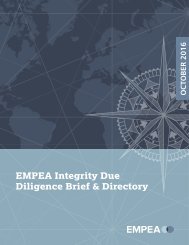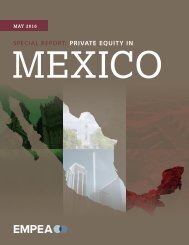Create successful ePaper yourself
Turn your PDF publications into a flip-book with our unique Google optimized e-Paper software.
It is also interesting to ponder whether financial centres<br />
should be a focal point for donors—Lion’s Head, “Does it<br />
really make sense for donors to promote the creation <strong>of</strong><br />
more than one administrative (<strong>of</strong>fshore) centre for Africa<br />
when it seems that most fund managers find that Mauritius<br />
is serving these needs well?” The Round Table noted—“Any<br />
attempt to build onshore centres will need to be differentiated<br />
from, and competitive with, Mauritius’s <strong>of</strong>fer.”<br />
The Round Table concluded that the principal options for<br />
technical assistance to prospective onshore centres might<br />
include:<br />
1) Providing case studies <strong>of</strong> successful examples <strong>of</strong><br />
financial centre development, including Mauritius’s own<br />
evolution as an <strong>of</strong>fshore centre;<br />
2) Creating a diagnostic roadmap to support a country to<br />
gain international approval, identifying risks and pitfalls<br />
along the way;<br />
3) Expanding Double Tax Avoidance Agreements<br />
(DTAA) networks, and helping stakeholders understand<br />
the process <strong>of</strong> regulatory reform;<br />
4) Improving messaging and communication to mend<br />
the political reputation <strong>of</strong> tax efficient centres and<br />
highlighting the sensible character <strong>of</strong> their structures;<br />
5) Establishing a policy performance bond, supported or<br />
underwritten by donors, as a political risk mechanism<br />
to hold governments to account on promises made.<br />
Scoping could establish how risk could be fairly and<br />
effectively shared among partners; and,<br />
6) A benchmarking service for national governments<br />
to assess appetite and ensure that projects are effective<br />
and not wasteful.<br />
The Round Table concluded that the principal donor support<br />
for private equity might include:<br />
1) In-depth research to understand what does and does<br />
not work when building PE in emerging markets;<br />
2) A survey <strong>of</strong> preferences and insights from financial<br />
institutions in the region, who are well positioned to<br />
assess, assist and monitor the market;<br />
3) A system <strong>of</strong> pr<strong>of</strong>essional standards that can be<br />
applied across the continent;<br />
4) Better benchmarking <strong>of</strong> cities, countries and<br />
companies; an accurate, potentially pan-African<br />
system <strong>of</strong> information can help companies share<br />
knowledge and observe market dynamics;<br />
5) Better incentives for fund managers such as the<br />
adjustment <strong>of</strong> hurdle rates (the return after which<br />
carried interest is received), rather than s<strong>of</strong>t funding /<br />
capital support; and,<br />
6) Technical assistance funding to capable fund<br />
managers, that is structured to ensure managers bear<br />
part <strong>of</strong> the costs.<br />
4.3 Conclusion<br />
On balance, the reports indicate two principal axes for<br />
donors to consider:<br />
• Public sector or private sector emphasis –<br />
the reports at times emphasise engaging with<br />
governments, at other times engaging directly with<br />
businesses and investors. The reports also switch<br />
between the need for substantive reform preceding<br />
development and the need for achieving economies<br />
<strong>of</strong> scale quickly. Fuchs favours specific engagement<br />
on specific issues with business—“Looking beyond<br />
the issue <strong>of</strong> scale experience suggests that the<br />
political economy <strong>of</strong> financial sector reform is an<br />
uncertain process, particularly when such reforms<br />
entail provision <strong>of</strong> public goods, such as a conducive<br />
legal and regulatory framework, strong judicial and<br />
oversight processes, efficient financial infrastructure,<br />
etc. Local private sector parties most impacted by<br />
shortfalls in current systems are likely to be the most<br />
vocal and effective drivers <strong>of</strong> such reform processes.<br />
Thus, rather than engage directly in dialogue with<br />
authorities on the reform process, the most impactful<br />
approach to supporting improvement may well be to<br />
build on the influence <strong>of</strong> those local private sector<br />
parties most impacted by current circumstances (such<br />
as PE fund managers whose activities are hampered<br />
by shortfalls in the enabling environment). They are<br />
likely to be the most effective drivers <strong>of</strong> such reform<br />
processes;” and,<br />
• People or information or institutions emphasis –<br />
the reports vary from Z/Yen emphasising training and<br />
education as well as information, to Bella Research<br />
recommending improved information provision for<br />
investors, to Econsult Botswana, Fuchs and Lion’s<br />
Head focussing on institutions. All <strong>of</strong> the reports make<br />
suggestions on infrastructure as well. Infrastructure<br />
issues range from power, water, telecoms, sanitation,<br />
and transportation to schooling, security, rule <strong>of</strong> law,<br />
and public information. However, there is no clear<br />
infrastructure theme possibly due to an assumption<br />
48 |





